Urban Legend: The people's psychiatrist and his happiness hypothesis

Much is said about mental healthcare today but for Dr C.R. Chandrashekar, the ‘people’s psychiatrist’, the journey to provide effective, affordable mental healthcare began over 30 years ago. He talks to Darshana Ramdev about the stigma around seeking help for mental illness and how the Mental Healthcare Bill could make things worse...
Depression: Let's Talk. This is the 2017 theme for World Health Day, which will be celebrated on April 7. A report by the World Health Organisation estimates that around 36% of Indians are depressed, a staggering statistic, one that compelled Prime Minister Narendra Modi to broach the subject. On Monday, March 27, the Lok Sabha also passed its Mental Healthcare Bill, one that seeks to protect the rights of the patient and de-criminalise suicide.
For Dr C.R. Chandrashekar, who retired as a Senior Professor of Psychiatry from NIMHANS back in 2013, the journey toward providing effective, stigma-free and affordable mental healthcare began nearly three decades ago. Known affectionately as the ‘people’s psychiatrist’ for his no-frills, egalitarian stance on mental healthcare, Dr Chandrashekar speaks with great restraint, careful not to extoll his own accomplishments - and there are many. The author of over 200 books in Kannada, nearly 50 in English and the founder of Samadhana, Dr Chandrashekar is at the forefront of bringing affordable mental healthcare to the masses, providing free treatment to those in need.
"I was approached by an NGO which asked me to train their grassroots level volunteers in counselling," he said. "I rose to the challenge at once." That led to his founding the Prasanna Centre in Basavanagudi in 1980, where he offered free medical help, held workshops on stress management and the importance of mental health. He even developed a training module for lay counselling, which is open to anybody who wishes to make a difference. "Our only condition is that they provide services on a volunteer basis and not use their skills to make a profit," he said. So far, he has trained over 5000 lay counsellors and 2000 teachers in student counselling as well.
He founded Samadhana back in 2007, while he was still a Senior Professor of Psychiatry at NIMHANS, Bengaluru. "The organisation celebrated its tenth anniversary last week," he smiled. They have 70 amateur counsellors on board, with about ten present at Samadhana at any time to meet clients. "Over 50% of the people who come to us are depressed," said Dr Chandrashekar. "Depression and anxiety are the most common problems among are clients," he remarked. Familial discord, behavioural problems and scholastic backwardness in children are some of the issues they treat regularly. "Loneliness and insecurity are major issues among older people," he said. "Then, you have those with serious mental disorders." The clients, he said, come from different classes of society, ranging from the financially backward to the educated and affluent.
Seeking medical intervention for a mental illness is still an eleventh-hour option for most people, Dr Chandrashekar explained, adding that superstition trumping science is a global phenomenon. "We did a pathways study and found that Psychiatry is something like the tenth option for people to deal even with illnesses like bipolar disorder," he said. And the treatment of choice? "They're most likely to believe that they are possessed by an evil spirit," he remarked. "Attempts at recovery are made through rituals, the advice of godmen and even sorcery before medical intervention is sought!"
Samadhana, he says, aspires to be a safe space, one that people can approach without being encumbered by the stigma that is still attached to seeking out mental healthcare professionals. "People are still hesitant to approach centres like NIMHANS, that's what prompted me to start Samadhana in the first place." How does he achieve this? "Through education, of course," he said promptly. He uses his proclivity for writing to spread awareness in a society steeped in superstition. "I give workshops and talks and demonstrate, as far as possible, that counselling interventions work. People come to me on their own now, asking for help.”
The situation has progressed a great deal since he began in 1980, when there were only 100 psychiatrists practicing across the state. "Outside NIMHANS, Bengaluru has around 100 psychiatrists and even fewer psychologists. The latter tend to go abroad as the demand for the treatment they offer (counselling without prescribing medicines) is still very low."
The mental healthcare bill, he says, as he departs to teach a class at the Prasanna Centre, will take a much more patient-oriented approach. "So far, the consent of family members is sufficient for doctors to provide treatment. The consent of the patient will be made mandatory, failing which the family members will need a court mandate. Discussions for the bill have taken place over five years, across stakeholders, but we will have to see how it plays out."

